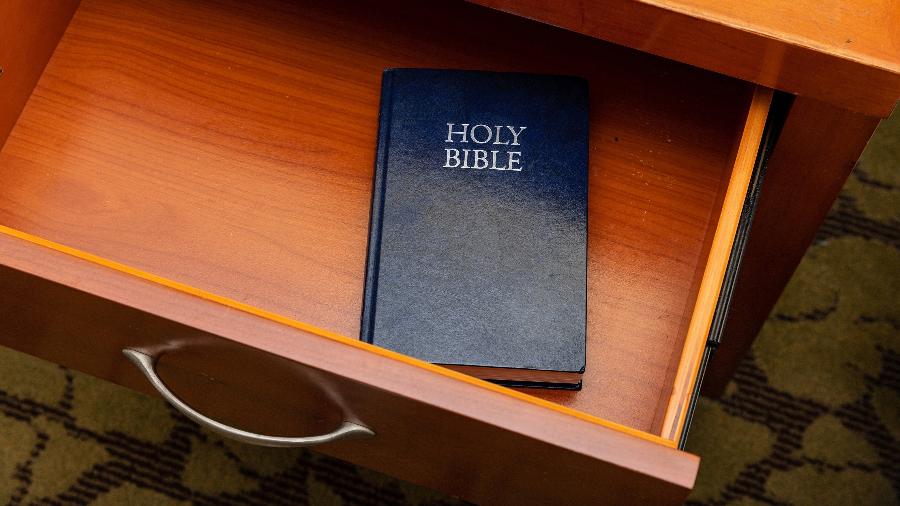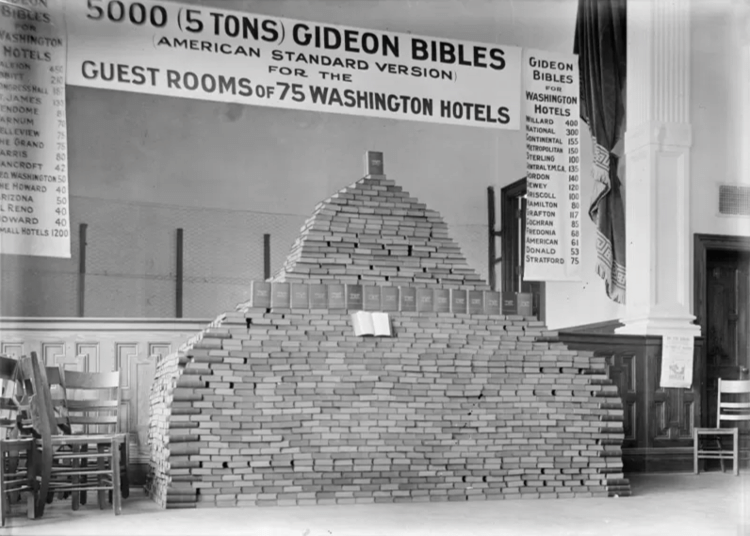Have you ever been to a hotel around the world and found a Bible in the drawer? It wasn’t by chance. Know this story.
Created at the end of the 19th century, the evangelical Christian entity Gideons aims to spread the word of God through the free distribution of copies of the Bible.
According to the Bible, Gideon was an example of faith. He would have been the fifth judge of Israel, about a thousand years before the birth of Christ, and, under his leadership, the people of Israel were freed from the Midianites, a people who were dominating the region and subjugating the Israelites.

By rabbinic tradition, he was a small, simple man from a lowly tribe. And yet he was chosen by God to lead the people — and this reason adds even more luster to his traditional biography. His name means “mighty warrior”.
At the end of the 19th century, three American traveling salesmen decided to borrow the name of the biblical figure to baptize the enterprise they had the idea of founding.
In 1899, Samuel Eugene Hill (1868-1936), John Nicholson (1859-1946) and William Knights (1853-1940) created the Gideons International organization, an evangelical Christian, nonprofit organization formed by Christian businessmen with the objective of spreading the word of God through the distribution, always free, of copies of the Bible.
Yes, they are responsible for that little bible, usually containing only the New Testament, Psalms and Proverbs, that can be found in the drawers of many hotel rooms around the world.
“Technically speaking, they are an organization of a religious and educational nature. Generally, the association is formed by businessmen, Christian professionals. And they make it clear, nowadays, that they are men and women, in this case their respective wives,” explains the theologian and historian Gerson Leite de Moraes, professor at Mackenzie Presbyterian University.

This emphasis on female participation is justified. Until 1941, the organization was restricted to men.
“Then it was understood that it would be more elegant for women to offer New Testaments to nursing staff in the Armed Forces, civil nurses in hospitals and other institutions,” points out Moraes, recalling that it was the occasion of the Second World War.
“Women began to act by offering free Bibles to other women, which would be more delicate in the view of the Gideons.” To this day, however, they are officially considered “helpers”—the so called gideons are just the men.
Moraes explains that the group’s members are usually gathered from campaigns in Protestant or evangelical churches, although the organization itself is not linked to any denomination.
“Their purpose, as the statute itself says, is to win people for the Lord Jesus Christ through the placement and free distribution of the Bible, or part of it, in hotels, hospitals, clinics, schools, public offices, prisons, Armed Forces and in other places, in institutions defined by the organization, as well as personal delivery by the members of the association,” explains the professor.
“We can say, therefore, that the Gideons are part of a group that permeates several Protestant denominations” says the historian.
HOW THE GROUP STARTED
There was a climate of economic effervescence in the United States in those last years of the 19th century. On the one hand, this motivated many businessmen to travel around the country, as salespeople and commercial representatives. On the other hand, this movement also provided arguments for religious conservatism—bolstering the concerns of those who saw cultural advancement as a risk to God’s hegemony.
“And the initial story of the Gideons is associated with this context and with two guys, two traveling salesmen who, at a certain point in their lives, in 1898, in the United States, arrived at a certain hotel and ended up having to share a room, because there weren’t any more available,” says Moraes.
It was Samuel Hill and John Nicholson and this little hotel where they met is the Boscobel Hotel and Central House in the town of Boscobel, Wisconsin.
It was on the night of September 14, 1898 and, according to a text published on the Gideons International website, when Nicholson arrived, around 9 pm, he was informed by the receptionist that the only possible option, giving that the hotel was full, it was for him to sleep in an extra bed that was in the room already reserved by Hill.
“Mr Nicholson looked around the hall and saw a drunk lying on the floor and another man passed out in the corner. He was relieved when he found that Mr Hill was the clean looking man who was taking his sales orders for the day,” says the text published by the organization.
According to the account, that night Hill slept while Nicholson continued working in the bedroom. Later, late at night, he resolved, as he usually did, to read a little from the Bible before going to sleep. That’s when Hill woke up.
“Mr. Hill, I’m sorry if I still keep the light on and woke you up, but I always use to read the Word of God and have a little chat with him before going to bed,” he would have said to his incidental companion.
Rather than seem uncomfortable, Hill reportedly got up and asked him to read together. They would have read the first 16 verses of chapter 15 of the Gospel of John, a passage where Jesus leaves the commandment of love and says that he chose his followers so that they would follow and bear fruit.
Inspired, they started a conversation about the need, in their understanding, to create an association of traveling Christian businessmen. According to the report published by the Gideons, the chat would have progressed until 2 am.
“They had a cult, a devotional, they prayed to God and established a strategy, an alliance, a pact” says historian Moraes.
“Perhaps this idea was inspired as much by the scene of indiscipline in the hotel lobby as by the devotional reading of the scriptures,” says the text.
“After all, the two gentlemen may have felt as if they were the only two men for miles around who were ‘shining like lights’ that night as they held fast to the word of life”, continues the text.
They stayed in contact and, almost a year later, on July 1, 1899, in the city of Janesville, also in Wisconsin, together with a third friend, also a businessman, William Knights, they officially founded the association – The Gideons International.
“They were commercial representatives who roamed the United States and thought that it was an excellent opportunity to spread the word of God”, contextualizes Moraes. “This association of three became an early Gideon cell.”
“Right now, faced with the effervescence of the United States, the most deeply rooted Christians are articulating to react to the cultural advances of the world, what they considered as excesses”, contextualizes the historian, who recalls that the foundations of American fundamentalism also date from that same period.
“[The Gideons’ strategy was] to take the word of God in a conservative crusade.There was an environment conducive to that mentality,” he says.
“What inspires these men [the first Gideons] is a fight against the worldly culture that was invading’ the Christian harvest”, comments Moraes.

GROWTH
The organization grew and spread rapidly. In 1907 the group began to leave a copy of the Bible in each hotel reception where they passed.
“Anyone who wanted could pick it up to read it. Starting in 1908 they decided to provide a Bible for every hotel room. And they realized that this strategy was elegant, it would work, and it was starting to pay off,” says Moraes.
In the first distribution, they placed 25 Bibles in a hotel in Montana. And the work continued like this until 1916, when they also began to make copies available in hospitals. During World War II they expanded into the Armed Forces. In 1946, they began visiting schools and distributing Bibles to students.
It was from 1947 onwards that the Gideons began to operate in countries other than the United States and Canada.
“Currently they say they have already distributed more than 2 billion deeds around the world. They are a very articulate organization, with capillarity,” says Gerson Leite de Moraes.
In Brazil, the association arrived in 1956, through a surveyor and university professor from Belo Horizonte called José Ramos Vilas Boas, who joined the organization in May of that year and, according to the book “Guia Os Gideões,” published by the association, carried out the first distribution of Bibles in the country on October 18, at the Legislative Assembly of the State of Minas Gerais.
“The formation of the Gideonic ministry in Brazil took place in 1958”, adds Moraes.
Since then, they have distributed 194 million copies.airs of the Bible in national territory.
“Almost the Brazilian population, which is impressive data”, compares the theologian.
To make these actions viable, they rely on contributions from associates and partnerships with companies that believe in the cause, as explained by the specialist.
TODAY
The professor comments that the initial strategy of supplying the copies to hotels ended up working very well.
“The text is there, the subject is in a hotel room or a hospital bed, they want comfort and they look in the New Testament for something that brings them peace, that brings them comfort. It works very well, hence the organization’s success,” he analyzes.
For practicality and economy, they ended up choosing to distribute a shortened version of the Bible, most of the time. The most common edition associated with the group is a pocket model that contains only the New Testament texts plus two Old Testament books: Proverbs and Psalms.
“They understand that this is already enough, according to the expression they themselves use, for the person to know Jesus Christ as Lord and Savior of their life”, contextualizes the theologian. With that they bring part of what they consider to be the word of God to reach people’s hearts”
The report sought both the group’s North American headquarters and the Brazilian organization with questions about the association’s history, its penetration in Brazil and whether there is any resistance, in contemporary times, to the distribution of religious content in places like hotels and schools.
Although there have been several contacts in the last six months, there has been no response from the North Americans. Also after repeated requests for an interview, the Brazilian headquarters limited itself to sending a note, signed by the national executive director, Moisés Danziger.
In the text, he “immensely appreciates” the interest in the subject but stresses that the group has “a rule, defined by the American headquarters, of not granting interviews or disclosing our work in communication vehicles […] open to the general public”.
“Our way of outreach is only within the environment of the churches that are partners in our evangelistic work,” added Danziger.
He also said that “the information that is public on our website can be used” for this purpose of communication.
According to the most recent annual report published by the American headquarters, in the last fiscal year the Gideons distributed 11.6 million Bibles in Latin America, 7.6 million in the United States, 2.9 million in Europe, 9.6 million in Africa, 12.8 million in Asia and 1.4 million in Oceania.
– This text was published at https://www.bbc.com/portuguese/geral-63746722
With information from UOL

